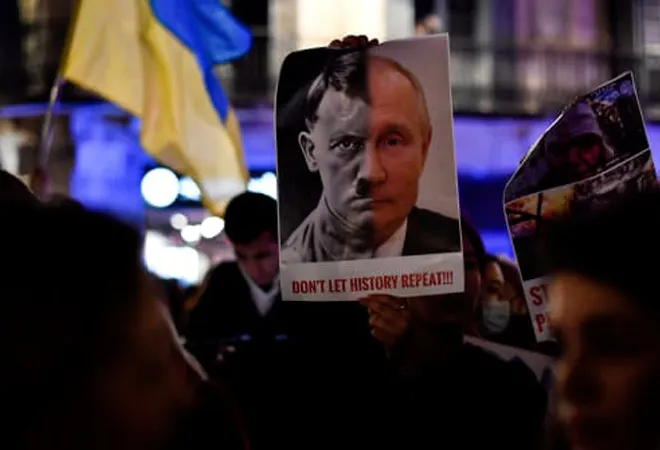-
CENTRES
Progammes & Centres
Location
The most significant challenge for the world though is the nuclear sabre-rattling that Russia’s top leadership is engaged in.

Russia’s war against Ukraine has reached an inflection point—politically, tactically and strategically.
President Putin is likely to announce the annexation of the breakaway regions of Donetsk and Luhansk as well as the occupied parts of the southern regions of Kherson and Zaporizhzhiain in a speech to a joint session of Russia’s parliament this week. Though these referendums have been described as a sham by Ukraine and its western allies, Moscow is claiming that there is near-universal support among the four million people asked to vote in the war-torn regions for joining Russia.
Moscow is egging Kyiv to make this move so that all bets would be off when it comes to Russian counterresponse. Even seven months after the launch of the war, Russian forces continue to struggle to make significant gains and one of the consequences has been the decision by the Kremlin to call up 300,000 reservists—a number now expected to be as high as one million. His decision to draft civilians into the military has led to protests and young men are fleeing Russia. The shortage of troops is a reality that Russia is having to contend with and Putin’s decrees are now challenging the seeming normalcy on the surface.
Even seven months after the launch of the war, Russian forces continue to struggle to make significant gains and one of the consequences has been the decision by the Kremlin to call up 300,000 reservists—a number now expected to be as high as one million.
The most significant challenge for the world though is the nuclear sabre-rattling that Russia’s top leadership is engaged in. Ever since the invasion of Ukraine in February, Putin has maintained that he might resort to using nuclear or chemical weapons to shape the trajectory of the conflict.
After recent military setbacks, he reiterated that he was prepared to “use all the means available,” including “various weapons of destruction”. Despite the US warning of “catastrophic consequences,” Dmitry Medvedev, deputy chair of Russia’s Security Council and former Russian President, further upped the ante by suggesting that the West would not intervene even if “Russia is forced to use the most fearsome weapon against the Ukrainian regime,” because the “demagogues across the ocean and in Europe are not going to die in nuclear apocalypse”.
This nuclear posturing is making it clear that the war is not going well for Russia. Instead of short, quick conflict, it is turning out to be a long-drawn affair— a strategic disaster shaped by multiple tactical retreats. For a leadership in Kremlin with its back against the wall, nuclear weapons are the last resort. That makes it a challenge for the rest of the world that is making it clear to Putin that this war must end quickly. Even India and China are on the same page on this. The choices that Putin makes in the coming days will decide not only the future of Russia as a global power but also the contours of global security in the 21st century.
This commentary originally appeared in Indian Express.
The views expressed above belong to the author(s). ORF research and analyses now available on Telegram! Click here to access our curated content — blogs, longforms and interviews.

Professor Harsh V. Pant is Vice President – Studies and Foreign Policy at Observer Research Foundation, New Delhi. He is a Professor of International Relations ...
Read More +